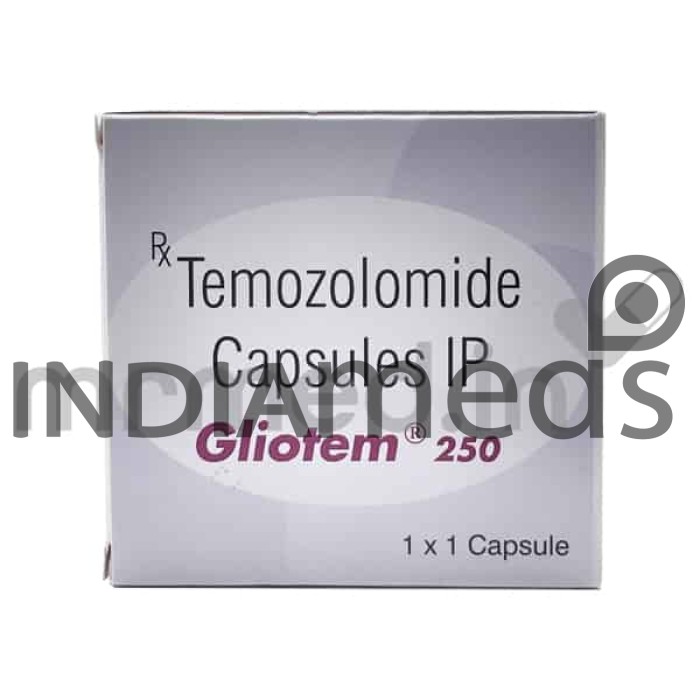Gliotem 250mg Capsule contains the active ingredient temozolomide. It belongs to the class of medications known as Antitumor agents. It is prescribed to treat brain cancer, such as glioblastoma multiforme in adults and malignant glioma, including glioblastoma multiforme or anaplastic astrocytoma in patients older than three years. Glioblastoma and anaplastic astrocytoma are the most common and aggressive brain cancers with low chances of survival. Anaplastic astrocytoma is treated with Gliotem 250mg Capsule or radiotherapy after biopsy, whereas Glioblastoma multiforme is treated with a combination of radiotherapy and Gliotem 250mg Capsule, and it is continued as maintenance therapy.
The common side effects that are likely to associate with Gliotem 250mg Capsule are nausea, vomiting, dizziness, diarrhea, constipation, hair loss, rashes, tiredness, frequent urination, vision and hearing problems, high blood sugar levels, muscle damage, pain in muscles and joints, memory loss, coordination problems, infections, sleep problems and loss of weight. Inform your doctor if any of these symptoms disturb you or persist.
Inform your physician if you are allergic to Gliotem 250mg Capsule and its ingredients. Before starting treatment with this medication, let your physician know if you have hepatitis B infection, anemia, low platelet count, low level of RBC and WBC, blood clotting problems, or any liver or kidney problems. Your physician will monitor your WBC and platelet counts regularly. Avoid taking this medication if you are pregnant or breastfeeding. Both women and men should use birth control to avoid pregnancy and fathering a child.
Therapeutic Effects of Gliotem 250mg Capsule
Pregnancy
Gliotem 250mg Capsule is unsafe to use during pregnancy as it may cause fetal harm. It should not be used unless prescribed by your physician. Women with childbearing potential should use effective contraceptive precautions for at least 6 months following the completion of treatment.
Breast Feeding
Gliotem 250mg Capsule is unsafe to use during breastfeeding as it passes through breast milk and harm the baby. Consult your physician for advice before breastfeeding.
Lungs
Inform your physician before taking Gliotem 250mg Capsule if you have if you have any lung conditions.
Liver
Inform your physician before taking Gliotem 250mg Capsule if you have severe liver problems. Dose adjustment is required based on the condition.
Alcohol
Avoid consuming alcohol while taking Gliotem 250mg Capsule as it may cause unpleasant side effects. Consult our doctor for advice.
Driving
Do not drive or operate heavy machines while being treated with Gliotem 250mg Capsule as it may decrease alertness, affect your vision and make you dizzy and sleepy.
Serious:
- Secondary cancer like myelodysplastic syndrome and myeloid leukemia.
- Severe Allergic reactions
- Inflammation and fluid buildup in lungs
- Blood clot in lungs or legs
- Liver toxicity
- Convulsions
- Fever and chills
- Severe headache
- Uncontrolled bleeding
Common:
- Hair loss
- Rashes
- Tiredness
- Nausea, vomiting and diarrhea
- Constipation
- High blood sugar levels
- Dizziness, impaired sensation, tingling sensation, abnormal taste
- Vision and Hearing problem
- Frequent urination
- Muscle damage, pain in muscles and joints
- Weight changes
- Infections and wounds
- Amnesia
- Abnormal blood cell counts
- Loss of appetite
- Sleep problems
- Memory loss
- Difficulty concentrating, changes in mental status and alertness
- Coordination problems
Gliotem 250mg Capsule belongs to the class of medications called Antitumor agents
No, Gliotem 250mg Capsule is not recommended for usage in children under 3. There is limited information on patients over the age of 3 who have taken this medication. Consult your doctor before taking Gliotem 250mg Capsule.
It is best to take Gliotem 250mg Capsule once a day on an empty stomach. Take the capsule at the same time every day for better results.
No, The live vaccine may interact with Gliotem 250mg Capsule. Hence, without consulting your healthcare provider, this medication should not be taken with any vaccinations.
No, taking Gliotem 250mg Capsule while driving and operating heavy machines may cause dizziness, sleepiness, and decreased alertness, affecting your vision.
Molecule name: Temozolomide | Therapeutic class: Alkylating agents |
Pharmacological class: Antitumor agents | Indications: 1. Treatment of newly diagnosed glioblastoma multiforme. 2. Treatment of refractory anaplastic astrocytoma |


